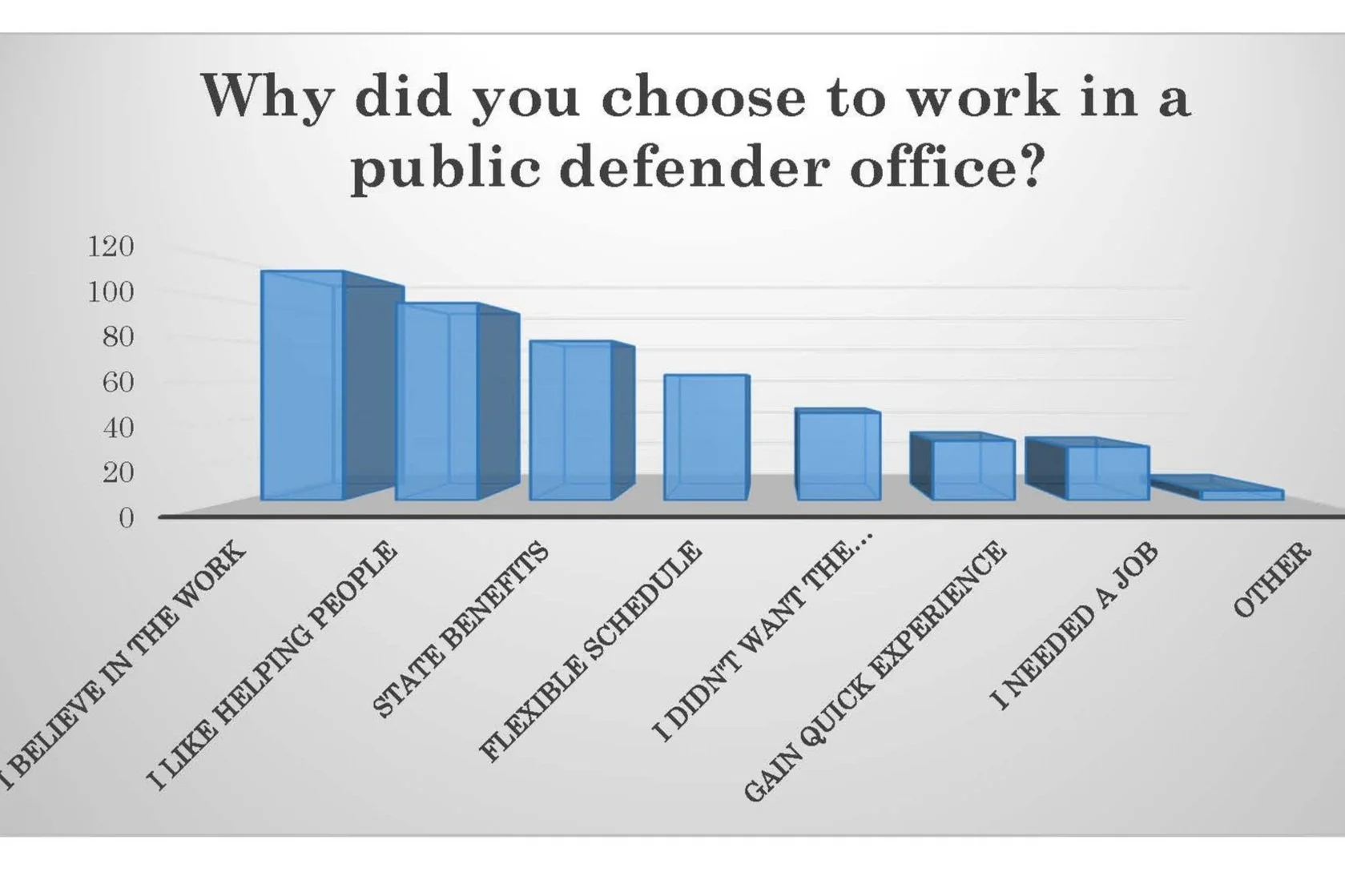Well-Being At Work: BIDS 2023 Well-Being Report Summary
by Caroline Zuschek, Deputy Capital Appellate Defender
This year's BIDS Well-Being Survey Report analyzed responses from a survey sent agency-wide in July 2023. Sixty-eight percent of the agency responded, including 80 attorneys, 33 administrative professionals, 17 investigators and/or non-attorney mitigation specialists, and 4 state-wide administrative professionals. Over one-third of the responses came from employees who have worked for BIDS for 3 years or less, and just under one quarter came from employees who have been with the agency for between 5 and 10 years. The remainder of the responses were from employees who worked for the agency between 3 and 5 years (16%), for between 10 and 20 years (10%), and people who have worked for the agency for 20 years or more (15%). You can read the full report here, but I’ve provided a summary below.
What Is Working
Responses showed general agreement amongst employees regarding circumstances that positively impact well-being at work. When asked to select the top three things that contribute positively to employee well-being from a fixed list, respondents overwhelming chose: (1) good relationships with colleagues (70%); (2) a flexible work schedule (58%); and (3) the opportunity to perform meaningful work (46%). Respondents were also asked what recent changes in the agency they would like to see continued, and many mentioned: continued pay raises, continued emphasis on and access to training, and continued increased support from the BIDS administration. Individuals also noted they enjoyed having contact with employees from other offices, the ability to work remotely, and wanted to see staffing increases continue.
Respondents also overwhelming rated their office culture positively—with 70% rating their office culture as a 4 or 5 out of 5. Likewise, a majority of employees, 65.6%, responded that they feel like part of a team while at the office (rating the team environment in their office as a 4 or 5 out of 5). Employees also felt generally supported by their office leaders, with 53% of respondents indicating they feel "very" supported, and an additional 29.1% indicating they feel "somewhat supported." Similarly, respondents indicated that communication from office leadership was generally sufficient to keep them informed, with 58% of employees scoring communication as a 4 or 5 out of 5.
Support from the overarching BIDS administration was also rated highly by respondents, with 64% of respondents stating they felt "very" supported, and an additional 26.3% indicating they felt some level of support. When asked what type of communication respondents preferred to receive from the administrative office, the most popular answers were: (1) emails; (2) face-to-face visits; (3) the BIDS newsletter, The Rap Sheet; and (4) Zoom meetings and/or Town Halls.
Helpful colleagues (82.7%); a supportive boss or office leadership (64.7%), and good resources like supplies and access to experts (46.4%) were the top three general supports respondents identified as presently existing in their office. Though helpful colleagues and a supportive boss have historically topped the list as existing supports within employees' offices, good resources was cited as a top-three support for the first time this year. Also, access to good training has continued to increase as an identified support across every year of the survey: 34.6% of respondents cited good training as an office support in 2023.
Overall, 41.8% of respondents indicated improvement in their well-being over 2023, and 32.8% indicated their well-being had remained the same since 2022. Moreover, BIDS employees indicate they remain mission-driven: 86% of respondents said they became a public defender because they believe in the work; and 74% said they did it because they enjoy helping people.
What Needs Work
When asked to identify three things negatively impacting work well-being, respondents selected: (1) insufficient pay (37.7%); (2) insufficient staff/attorneys (32.3%); (3) workload (29.2%); (4) a lack of promotion and raise structure (27.7%); and (5) compassion fatigue and burnout (25.4%). In past years, insufficient pay was aggregated with the lack of raise and/or promotion structure. If done this year, 65.4% of people who responded selected one or both of those options as a main detractor from their well-being. Though pay was not rated the top detractor from well-being following the pay raises of July 2022, it has reemerged as a central issue for a majority of employees.
That said, workload has also remained a priority for employees. When asked to choose the single primary detractor from well-being at work, in order, respondents selected: (1) workload (20%); (2) pay (18.5%); (3) lack of raise/promotion structure (9.1%); and (4) lack of sufficient staff/attorneys. (7.7%). If aggregated, 27.7% of individuals indicated pay/lack of raise/promotion structure was the single biggest detractor to work well-being, and 27.7% indicated workload and/or lack of sufficient staff and attorneys was the single biggest detractor from well-being. Every year since the BIDS well-being survey began, the number of people who indicated workload is the primary detractor from their well-being has increased. In fact, 60% of respondents indicated that their workload did not permit optimal representation of their clients (by scoring their ability to provide such representation as a 1, 2, or 3 on a 5-point scale).
For the first time this year, the survey asked respondents about diversity, equity, and inclusion within the workforce. A small majority of respondents indicated that they wished BIDS would do more to increase these values within the workforce. When asked to explain why they believed BIDS should take more initiative in this respect, respondents noted that the BIDS workforce was overwhelming white, and failed to reflect the populations served by our offices. A small minority of respondents (21.3%) stated that the office they worked for had a specific, diversity, equity, and inclusion initiative, compared to 78.7% of respondents who stated their office had no such initiatives. The respondents who answered that their office did have a DEI initiative were asked to describe it. Of the 17 responses, most gave examples of informal initiatives such as treating all employees equally, and treating all clients respectfully. One respondent stated their office had diversity training, and another noted their leadership recruited locally with an emphasis on encouraging diversity of applicants.
In terms of individual offices, though the responses to questions regarding communication, leadership, teamwork, and support from leadership indicated generally positive workplace experiences, a small minority of responses indicated significant dissatisfaction with their individual workplace. For instance, 7.5% of employees stated they did not feel at all supported by their office leadership, and 22% of respondents found their office leaders' communication inadequate to keep them informed (a 1 or 2 out of 5).
When asked about supports still needed in offices, respondents indicated their offices needed: (1) more up-to-date technology (48.5%); (2) more attorneys and staff (47%); and (3) caseload limits (28.8%). Caseload limits was cited as a top-three necessity for the first time this year. Last year, respondents indicated a need for increased training. A significant number of responses also indicated that correction of physical office issues was necessary, with 23.5% of respondents selecting it as one of their top three priorities for better support in the coming year. When asked to specify the physical office issues that need addressing, respondents requested: (1) updates to outdated or rundown office space (48%); (2) sufficient office space for all employees (46%); (3) increased storage space (41.5%); (4) replacement of old and dirty furniture (39%); (5) general office repairs (26%); and (6) access to drinking water and sanitary working conditions (17.1%).
Moreover, about 50% of BIDS employees indicated they'd considered leaving their job in the last year. When asked why these employees considered leaving their jobs, the top answers were: (1) pay; (2) lack of opportunities for advancement; (3) burn-out and compassion fatigue; and (4) workload. As a result, it is not surprising that 68% of employees were either unsure if they saw themselves working for BIDS in 10 years, or affirmatively did not see themselves still working at BIDS. When asked what could make them stay for the next 10 years, respondents indicated increased pay and opportunities for promotion were the most critical factors for long-term employee retention.
The survey asked respondents to indicate how much their pay would need to increase to achieve pay parity with other professionals in their field. Eighty-three percent of respondents indicated a raise of 10% or more would be necessary.
What Is In the Works
The results of the survey were presented to the BIDS Board in August 2023 so that they could be used to inform the Board's budget requests for the next fiscal year. The Well-Being Committee recommended continuing efforts to increase employee pay and pay parity, additional staffing across the offices, an emphasis on diversity, equity, and inclusion, increased communication from the administrative office about their efforts to secure more and better resources, and physical office improvements.
Moreover, the Well-Being Committee itself is reforming. While it will continue to conduct the annual survey, it aspires to do more and several projects are in the works. If you have questions or would like to join us, please feel free to reach out to me at czuschek@sbids.org.

